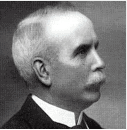The Database Mole Presents Survival tips for PowerPoint boredom
“…there are occasions in all of our working lives when sitting through a PowerPoint presentation is inevitable. Fortunately, there are techniques for feigning interest, many of which have developed over hundreds of years. All you need is a handful of like-minded colleagues with a sporting attitude.”
When Cardinal John Henry Newman wrote “The Dream of Gerontius,” his renowned poem about the death of an old man, he penned these lines:
‘Tis this strange innermost abandonment,
This emptying out of each constituent
And natural force, by which I come to be.
Newman’s description bears an uncanny resemblance to the near-death experience of sitting through a PowerPoint presentation by an IT salesman. The longer you listen, the worse it gets, until you feel like heading for the light the moment the company growth charts hit the screen.
While the first few presentations can be tolerable, the brain soon reaches a point of allergy and gives up trying to wrest meaning from the droning stream of waffle. The harder you struggle to stay awake, the more a torpor steals over you, as the brain attempts a body-wide shutdown due to lack of stimulation.
Once the IT salesman has the laptop and the screen, nothing will deter him from his speech. He will attempt to soothe you with smooth, bland phrases while, by gesture and eye contact, he aims to induce a visceral liking for his product, even if the logical part of your brain is screaming “It’s shite!”
There is no alternative but to fight back.
You may think that the most effective way to do so is to sit quietly and attentively until the first PowerPoint page appears on the screen. Then, you and your colleagues would put your fingers in your ears and shout “LA, LA, LA!” until the salesman stops talking.
I thought the same myself until a team I was in actually tried it. Unfortunately, the salesman’s manager had just taken our IT director to a very expensive lunch, and the atmosphere in the department became very tense as a result.
In reality, there are occasions in all of our working lives when sitting through a PowerPoint presentation is inevitable. Fortunately, there are techniques for feigning interest, many of which have developed over hundreds of years. All you need is a handful of like-minded colleagues with a sporting attitude.
The games people play
The first, most traditional, game is called “J for Jesus,” so-named by the choirboys who developed it to overcome the monotony of sermons. Each participant contributed a sum of money to a pool or tote, and listened during the sermon for a two- (or more) syllable word beginning with A. The boys then listened and remembered a word beginning with B, then C, and so on.
The first boy to get to J blew his nose, which was why there were so many handkerchiefs whipped out when the vicar said the word Jesus halfway through his sermon. In the vestry, if the winner could remember every alphabetical word and there was general agreement that the words were spoken, he collected the money. If his memory faltered, he doubled the tote for the next sermon.
This game was easily adapted to the IT industry, although there are few multi-syllabic words that begin with J. So whenever the participants are waiting for a word beginning with J, the tension in the room becomes palpable. I remember one occasion in which the tension got so great that the winner gave out a whoop and punched the air when the salesman mentioned “the justification process.”
In some versions of the game, it is legal to ask a leading question such as “Would it be fair to say that it is the juxtaposition of your product with our business environment that is important?” In general, however, this is ruled out of play.
Speaking in tongues
On a number of occasions I was part of a team asked to adjudicate between suppliers over the choice of a “strategic” product for the business. Many PowerPoint presentations ensued. On one team, we quickly tired of the Jesus game and went on to analyze the words and phrases used by the salesmen.
IT salesmen spout gibberish of a special sort, a queer language in which meaning has little place. The phrases themselves can be fascinating, particularly when you stop trying to clutch at their meaning:
Fourth-generation environment, function hierarchy analysis, structured business analysis, inevitability of amelioration, attenuation of subsequent feedback, relational flexibility, strategic framework, dynamic systems strategy, technical coherence, high-leverage area, internal resource capability, separate roles and significances of the formal strategic direction, interactive concern-control system, calculus of consequence, functionality matrix, conceptual baseline…
The Jesus game thus evolved into a more complex sport of picking out waffle phrases. At first we tried an alphabetical system, but eventually decided that in addition to quantity, phrases would be judged on quality as well. To “own” a phrase, you had to ask a question that included the phrase that the salesman had just used.
Using one of the examples above, a participant might ask: “Would you consider that the separate roles and significances of the formal strategic direction had a particular value in the context of your product?” This signaled the others that the phrase was “yours.”
The rating process involved writing down the phrases and getting participants to rate them on their absurdity. As time went on, we collected the best and seemingly most powerful phrases until we had a phrase bank that could be used to generate automated PowerPoint presentations. This was the famous “waffle generator,” which spread like a virus through the industry.
Use your assets
The waffle game electrified the presentations. The salesmen would be surprised to see a row of keen faces in the audience, eyes bright like buttons, lapping up every word and asking intelligent questions. Unfortunately, the very nature of the game made it go sour, because our apparent interest only stimulated the salesmen to talk more.
The great virtue of the Jesus game was that, after the J word had been spoken, the audience lost interest in the presentation. Sensing that something had gone wrong, the salesman truncated his presentation and shut up. The waffle game had to be modified so that only the first 10 minutes of the presentation were allowed.
I have come across other games too. The “situation” game offers considerable scope. The audience divides into two teams that take alternate presentations and try to induce the speaker to say the word “situation” the most number of times. There are few rules, and the ingenuity of the cheating can be fascinating.
My best team ever included a young graduate trainee named Louise who was quite well endowed. We worked out a technique in which Louise would lean forward slightly in her chair every time the salesman said “situation.” Like one of Pavlov’s dogs, the salesman would unconsciously increase his use of “situation,” until his speech was peppered with the word.
Even in the age of the iPod, when no one need suffer from PowerPoint presentations, you will find me chuckling appreciatively in my seat, taking lots of notes and listening attentively. The collection of phrases of complete techno-babble can become an intrinsic joy forever, even without the money and the competition.





Load comments